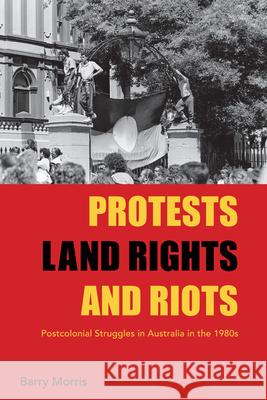Protests, Land Rights, and Riots: Postcolonial Struggles in Australia in the 1980s » książka
Protests, Land Rights, and Riots: Postcolonial Struggles in Australia in the 1980s
ISBN-13: 9781782385370 / Angielski / Twarda / 2014 / 216 str.
"Morris deploys the incisive tools of anthropology to deconstruct the way neoliberal policies of the 1980s began to reverse the political gains Australian Aborigines had made in the 1970s...This work is of crucial relevance for thinking beyond the present neoliberal impasse." - Gillian Cowlishaw, Sydney University "Morris reveals the lie underpinning so much recent cant but more sets the situation of Aborigines in the context of larger global forces. This is a much overdue work that should contribute to new understanding and which breaks out of some of the enduring categories that continue to inhibit critical thought." - Bruce Kapferer, University of Bergen "Morris is not afraid to study systemic interrelationships; how history brings together structure and events in ways that might be unique but not random." - Andrew Lattas, University of Bergen The 1970s saw the Aboriginal people of Australia struggle for recognition of their postcolonial rights. Rural communities, where large Aboriginal populations lived, were provoked as a consequence of social fragmentation, unparalleled unemployment, and other major economic and political changes. The ensuing riots, protests, and law-and-order campaigns in New South Wales captured the tense relations that existed between indigenous people, the police, and the criminal justice system. In Protests, Land Rights, and Riots, Barry Morris shows how neoliberal policies in Australia targeted those who were least integrated socially and culturally, and who enjoyed fewer legitimate economic opportunities. Amidst intense political debate, struggle, and conflict, new forces were unleashed as a post-settler colonial state grappled with its past. Morris provides a social analysis of the ensuing effects of neoliberal policy and the way indigenous rights were subsequently undermined by this emerging new political orthodoxy in the 1990s. Barry Morris is the author of Domesticating Resistance, Race Matters and Expert Knowledge. He is a Senior Lecturer in Anthropology at the University of Newcastle.
"Morris deploys the incisive tools of anthropology to deconstruct the way neoliberal policies of the 1980s began to reverse the political gains Australian Aborigines had made in the 1970s...This work is of crucial relevance for thinking beyond the present neoliberal impasse." · Gillian Cowlishaw, Sydney University"Morris reveals the lie underpinning so much recent cant but more sets the situation of Aborigines in the context of larger global forces. This is a much overdue work that should contribute to new understanding and which breaks out of some of the enduring categories that continue to inhibit critical thought." · Bruce Kapferer, University of Bergen"Morris is not afraid to study systemic interrelationships; how history brings together structure and events in ways that might be unique but not random." · Andrew Lattas, University of BergenThe 1970s saw the Aboriginal people of Australia struggle for recognition of their postcolonial rights. Rural communities, where large Aboriginal populations lived, were provoked as a consequence of social fragmentation, unparalleled unemployment, and other major economic and political changes. The ensuing riots, protests, and law-and-order campaigns in New South Wales captured the tense relations that existed between indigenous people, the police, and the criminal justice system. In Protests, Land Rights, and Riots, Barry Morris shows how neoliberal policies in Australia targeted those who were least integrated socially and culturally, and who enjoyed fewer legitimate economic opportunities. Amidst intense political debate, struggle, and conflict, new forces were unleashed as a post-settler colonial state grappled with its past. Morris provides a social analysis of the ensuing effects of neoliberal policy and the way indigenous rights were subsequently undermined by this emerging new political orthodoxy in the 1990s. Barry Morris is the author of Domesticating Resistance, Race Matters and Expert Knowledge. He is a Senior Lecturer in Anthropology at the University of Newcastle.











